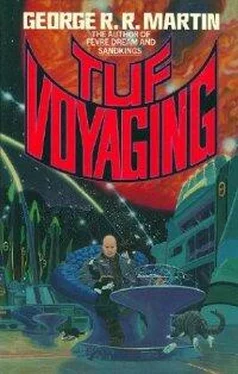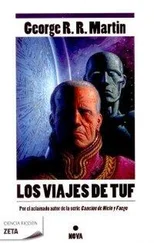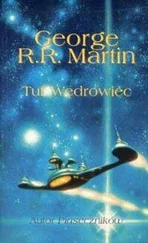“Nonsense,” said Moses. He began walking downhill, toward the pillar of fire. “Who are you?”
“I am who I am,” the pillar of fire said, retreating hastily as Moses advanced. “I am the Lord God.”
“You are a holographic projection,” Moses said, “emanating from that silly cloud above us. I am a holy man, not a stupid one. Go now.”
The pillar of fire stood its ground and rumbled threateningly. Moses walked right through it, and continued smartly down the hill. The pillar remained, writhing and spinning, until long after Moses had vanished. “Indeed,” it boomed in its vast thunderous voice to the empty night. Then it shuddered and winked out.
The small grey cloud scuttled across the hills and caught up to Moses a kilometer down the road. The pillar of fire snaked down again, crackling with ominous energy. Moses walked around it. The pillar of fire began to follow him.
“You city-dwellers begin to try my patience,” Moses said as he walked. “You seduce my people with your sinful, slothful ways, and now you interrupt my evening reflections. I have had a hard day of holy toil. Be warned that you are near to provoking me. I have forbidden all this traffic with science. Take your aircar and your hologram and be gone with you, before I bring down a plague of boils upon your people.”
“Empty words, sir,” said the pillar of fire, trailing close on his heels. “Boils are well beyond your limited abilities. Do you think to deceive one such as I as easily as you deceived that pack of small-visioned bureaucrats?”
Moses hesitated, and cast a thoughtful look over his shoulder. “You doubt the powers of my God? I would think that my demonstrations had been ample enough.”
“Indeed,” said the pillar of fire. “Yet the things demonstrated were your own limitations, and those of your opponents. It is clear that you planned long ahead, and well, but your only powers were in that.”
“No doubt you believe the plagues that swept the City of Hope were coincidence, bad fortune?”
“You mistake me, sir. I know full well what they were, and there was nothing supernatural in any of them. For generations the young and the disaffected among the Altruists had been emigrating to the City. How simple and obvious to plant among their numbers your own spies, saboteurs, and agents. How cunning to wait a year or two or five until each among those had been fully accepted into the City of Hope, and given positions of responsibility. Frogs and insects can be bred, sir, and easily, whether in a cabin in the Hills of Honest Labor or in an apartment complex within the City itself. Release such creatures in the wild, and they will dissipate and die. The elements will slay them, natural enemies will hunt them down, they will perish for want of food; the complex merciless mechanism of the ecology will set them in their natural place. But how different within an arcology, the veritable architectural ecology that is truly no ecology at all, for it has a niche for no animal but humanity alone. The weather within is always fair and gentle, no competing species or predatory enemies exist, and it is an easy enough thing to find a proper source of food. Under such conditions, the result is inevitably a plague. Yet a false plague, looming large only within the confines of the City. Outside, your little plagues of frogs and lice and flies would be as nothing to the wind and the rain and the wild.”
“I turned their water into blood,” Moses insisted.
“Indeed, your agents placed organic chemicals in the City’s water supply.”
“I brought down a plague of darkness,” Moses said. His tone had grown quite defensive.
“Sir,” said the pillar of fire, “you insult my intelligence with the obvious. You turned out a light.”
Moses swung about to face the pillar, glaring up at it defiantly, his face red by reflected light. “I deny this. I deny all of it. I am a true prophet.”
“The true Moses brought down a grievous murrain upon his enemies,” the pillar of fire boomed in an even voice, as much as thunder can be even. “You brought none. The true Moses set upon his enemies a festering sweat of boils, so that none could stand before him. You did not. Your omissions give you away, sir. True pestilence is beyond your powers. The true Moses devastated the lands of his enemies with hail that rained down day and night. That plague too defeated your own limited capacities. Yet your enemies, beset by your tricks, surrendered the City of Hope before the tenth plague, the death of the first-born, and that was to your great good fortune, for by that time you were of a certainty plagued out.”
Moses smote the pillar of fire with his staff. There was no apparent effect on either staff or pillar. “Move off,” he shouted. “Whoever you are, you are no God of mine. I defy you. Do your worst! You have said it yourself: in nature, plagues are less simple things than inside an arcology. We are secure in the simple life we live in the Hills of Honest Labor, close to our God. We are full of grace. You cannot harm us.”
“Indeed,” boomed the pillar of fire. “You are wrong, Moses. Give my people back! ”
Moses was not listening. He walked through the fire again and, furious, began to race back toward the village.
“When will you start?” Jaime Kreen asked eagerly after Haviland Tuf had returned to the Ark. He had remained aboard after taking the other Charitans back to the surface, since—as he had pointed out—the City of Hope was uninhabitable and there was no place for him in the villages and work camps of the Altruists. “Why aren’t you working? When will—”
“Sir,” said Haviland Tuf. He was sitting in his favorite chair, eating a bowl of creamed mushrooms and lemon-peas. A mug of ale sat on the table by his side. “Do not presume to give me orders, unless you chance to prefer the hospitality of Moses to my own.” He sipped at his ale. “Such work as needs be done has been done. My hands, unlike your own, were not entirely idle during our voyage from K’theddion.”
“But that was before . . . ”
“Details,” said Haviland Tuf. “Most of the basic cloning is done. The clones too have kept themselves occupied. The breeding tanks are full.” He blinked at Kreen. “Leave me to my dinner.”
“The plagues,” said Kreen. “When will they begin?”
“The first,” said Haviland Tuf, “began some hours ago.”
Down through the Hills of Honest Labor, past the six villages and the rocky fields of the Holy Altruists and the sprawling barren work camps where the refugees were quartered, ran the wide slow-flowing river that Altruists called God’s Grace and other Charitans the River of Sweat. When dawn broke on the distant horizon, those who had gone down to the riverside to fish or fill their jugs or wash their clothing returned to the villages and work camps with cries of horror. “Blood,” they shouted. “The river is blood, as the waters of the City were.” Moses was sent for, and he went to the river reluctantly, wrinkling his nose at the smell of dead and dying fish, and the stink of blood itself. “A trick of the sinners of the City of Hope,” he said, when he looked down on the sluggish scarlet stream. “The Lord God renews the natural world. I will pray, and in a day the river will be clean and fresh again.” He stood in the mud, at his feet a bloody shallow pool full of dead fish, stretched out his staff over the diseased waters, and began to pray. He prayed for a day and a night, but the waters did not clear.
When dawn came again, Moses retired to his cabin, and gave orders, and Rej Laithor and five other top administrators were taken from their families and questioned most intensely. The questioners learned nothing. Patrols of armed Altruists went upstream, searching for the conspirators who were dumping chemical pollutants into the river. They found nothing. They traveled for three days and three nights, as far as the great waterfall in the High Country, and even there the tumbling waters were blood, blood, blood.
Читать дальше












